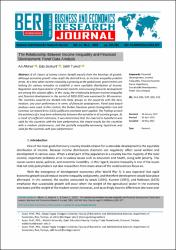| dc.contributor.author | Altıner, Ali | |
| dc.contributor.author | Bozkurt, Eda | |
| dc.contributor.author | Türedi, Salih | |
| dc.date.accessioned | 2023-03-10T08:02:04Z | |
| dc.date.available | 2023-03-10T08:02:04Z | |
| dc.date.issued | 2022 | en_US |
| dc.identifier.citation | Altıner, A., Bozkurt, E. & Türedi, S. (2022). The Relationship Between Income Inequality and Financial Development: Panel Data Analysis. Business and Economics Research Journal, 13(3), 349-366. http://doi.org/10.20409/berj.2022.377 | en_US |
| dc.identifier.issn | 2619-9491 | |
| dc.identifier.uri | http://doi.org/10.20409/berj.2022.377 | |
| dc.identifier.uri | https://hdl.handle.net/11436/7863 | |
| dc.description.abstract | If all classes of society cannot benefit equally from the blessings of growth,
although economic growth rates reach the desired level, an income inequality problem
arises. At a time when income inequality is growing at the global level, governments are
looking for various remedies to establish a more equitable distribution of income.
Regulation and improvement of financial markets and ensuring financial development
are among the solution offers. In this study, the relationship between income inequality
and financial development in the period of 2000-2015 was examined for 30 countries.
The countries covered are divided into three groups as the countries with the best,
medium, and poor performance in terms of financial development. Panel data-based
analyses were used. In this context, the Durbin-Hausman panel cointegration test and
Common Correlated Error (CCE) coefficient estimator were applied. The findings proved
the existence of a long-term relationship between the variables in all country groups. As
a result of coefficient estimates, it was determined that the inverted U-hypothesis was
valid for the countries with the best performance, the mixed results for the countries
with a medium performance, and the partially inequality-narrowing hypothesis was
valid for the countries with poor performance. | en_US |
| dc.language.iso | eng | en_US |
| dc.rights | info:eu-repo/semantics/openAccess | en_US |
| dc.subject | Financial development | en_US |
| dc.subject | Income inequality | en_US |
| dc.subject | Financial kuznets curve hypothesis | en_US |
| dc.subject | Sustainable development | en_US |
| dc.subject | Panel data analysis | en_US |
| dc.title | The relationship between income ınequality and financial development: Panel data analysis | en_US |
| dc.type | article | en_US |
| dc.contributor.department | RTEÜ, İktisadi ve İdari Bilimler Fakültesi, İktisat Bölümü | en_US |
| dc.contributor.institutionauthor | Altıner, Ali | |
| dc.contributor.institutionauthor | Türedi, Salih | |
| dc.identifier.doi | 10.20409/berj.2022.377 | en_US |
| dc.identifier.volume | 13 | en_US |
| dc.identifier.issue | 3 | en_US |
| dc.identifier.startpage | 349 | en_US |
| dc.identifier.endpage | 366 | en_US |
| dc.relation.journal | Business and Economics Research Journal | en_US |
| dc.relation.publicationcategory | Makale - Uluslararası Hakemli Dergi - Kurum Öğretim Elemanı | en_US |


















